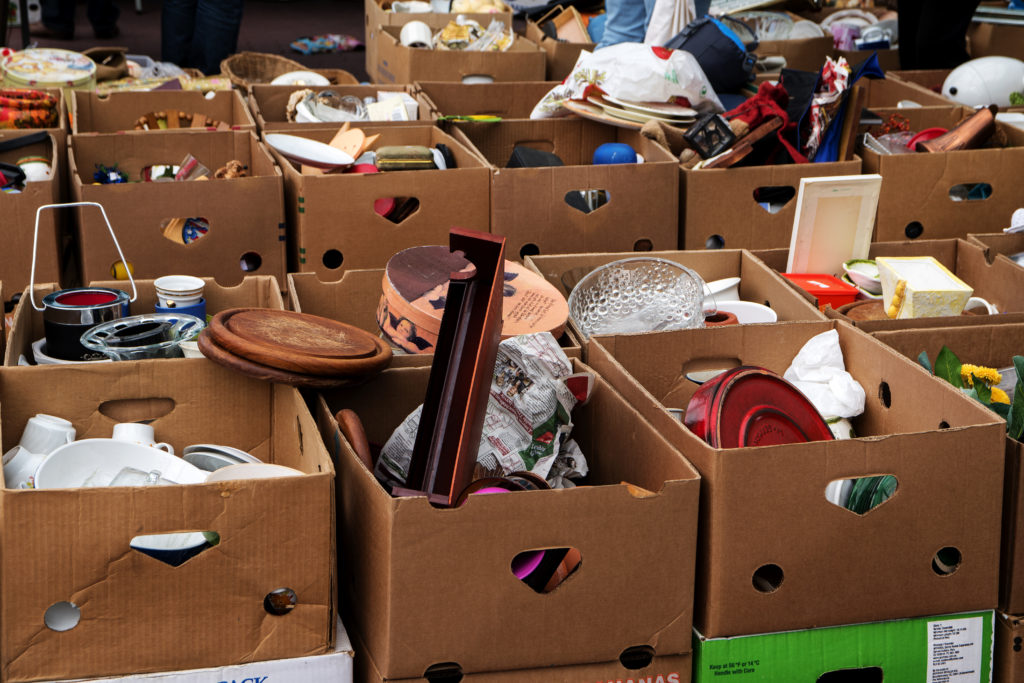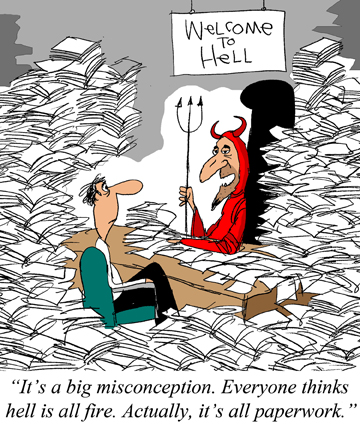Most people would rather have a root canal than organize their paper. I have yet to find anyone who likes to organize their paper clutter.
Bills, documents, notes on old legal pads, mysterious receipts, birthday cards from people you do and don’t remember, even something pleasurable such as photos of your family can feel like an insurmountable chore to organize.
Plowing through piles or bins of paper is different from other types of organizing. It requires a whole different set of decisions and brain skills and unlike organizing 3-dimensional objects such as your clothes or dishes, paper is often fraught with all kinds of meaning – most typically fear and anxiety and to a lesser degree, sentiment and confusion.
Paper doesn’t have the same qualities that other objects have in our lives. It’s not pretty or shiny or useful, except in its blank (note pads) or decorative (wrapping paper) form. Organizing paper won’t make it more possible for you to entertain, unless it’s covering your dining room table.
Face it, for most people, organizing paper is boring.
Complicating the process is age. The older we get, the harder it is to focus on the task of organizing paper. It takes all kinds of executive functioning skills that get harder as we age. It’s more than just a matter of know what to keep and what to toss.
The moment we look at our paper piles, our brains become Scarlett O’Hara from Gone with the Wind. “I can’t think about it now. I’ll think about it tomorrow.”
Paper organizing requires careful review. You can look at a piece of clothing and know it’s a piece of clothing. With paper you have to study it. Is it a bill? A statement? An insurance policy? Is it something important? Do I need to act on it? Will I need it later?
With paper, you are already exhausted by the time you figure out what it is.
It’s no wonder that even in the age of going “paperless” we still have so much paper.
During my career as a professional organizer, move manager and now organizer coach, I have encountered virtually every type of paper and document that exists. I have also written extensively on the process of organizing your paper. But it doesn’t matter how well its sorted into tidy little piles. If you don’t or can’t make a decision about it, it probably won’t get put away.
Here’s the good news about paper organizing.
In most cases, if you never organize your paper, nothing really bad will happen. The sky won’t fall. You won’t go to jail. Your children won’t be hurt. You won’t get sick, at least not from the paper. Will it cost you? Maybe, if you forget to pay a bill, or don’t do your taxes or forget your daughter’s birthday (God forbid!). Even if you forget to pay your electricity bill, don’t worry, you’ll get another reminder, and another.
Would it be inconvenient or possibly stressful to forget to pay your electricity bill? Yes, but it’s not life threatening unless you are on life support and if so, organizing your paper is not going to be top of mind.
The worst part about paper clutter is that it’s often a reflection of our state of mind The more clutter, the more we realize we’re feeling confused, overwhelmed or neglectful. This creates more anxiety and confusion and the cycle repeats.
It’s better to have a system for managing your mail, paying your bills, filing important documents or knowing what you should shred to protect your identity. These are all habits and elements of life that make us feel calmer, lighter and in control of our lives. But if you don’t already have these habits, and are not inclined to learn them now, you can still feel less stressed about your paper clutter.
Here are some ways you can manage your guilt or alleviate your anxiety about your paper piles.
- You know all those saved letters and greeting cards you’ve kept over the years? You’re not likely to ever look at them unless you’re moving or downsizing your home and probably not even then. If you never look at them again, it’s not a problem. Your adult children will have to at some point but that’s another story.
- If you overlook a bill, you’ll get another. Don’t sweat it.
- You don’t have to support every charity that keeps mailing you solicitations for donations. This is true especially if you have a limited income. Seniors are their favorite customers since they count on you forgetting that you donated last month or last year. When you get them in the mail, toss them.
- If you feel strongly about supporting your favorite charity allocate no more than 1% of your total income and divide that up between your five favorite charities. Let’s say you earn $75,000 a year. 75,000 x 1% = 750. 750/5=150. Donate no more than $150 to your favorite charities.
- If you didn’t order something from that catalog when you got it, you probably won’t. Recycle it.
- Keep your family photos. Even if you never look at them. They don’t take up that much space.
- If you have more than a grocery bags worth of documents to be shredded, take them to be shredded. It’s not worth your time to do it yourself.
- Stop ripping up envelopes with your name and address – unless doing so gives you satisfaction. Your name and address are public information. An identity thief can’t hurt you with just your name and address.
- If you see your complete social security number on anything, shred it!
-
Keep a bin near where you open your mail. That way all the junk can get tossed right away.
- Empty your mailbox daily. A stuffed mailbox is a sign that something is wrong in your home.
- The IRS will never call you. Open anything that comes from them.
- Stop saving investment statements. They are obsolete from the moment you get them.
- If you can easily find it in your email or online, you don’t need to keep the paper copy.
- If you have more than 1 or 2 boxes of unsorted paper that you have not looked at in more than six months, you probably won’t.
- There is an 80 percent chance that anything you file you will never look at again.
- If you want to find something really important, chances are you can request a copy, unless of course it’s a love letter or your 6th grade report card.
- Don’t spend your retirement years going through your files unless you really want to.
- If you have paper on nearly every surface in your home, including floors, near your stove or on your bed, then it’s time to call in a professional, for your safety.
- If you have any reason to believe you’ve been a victim of fraud or if you suspect someone has access to your credit information without your consent, contact all three credit reporting agencies immediately and submit a fraud alert.
Experian:1-888-397-3742
Equifax: 1-866-640-2273
Transunion: 1-800-813-5604
Have an organizing question or need help getting organized to move or want to schedule a coaching session? Schedule a free, no obligation phone chat with me using this link. https://calendly.com/lisbethmckinley/30min










